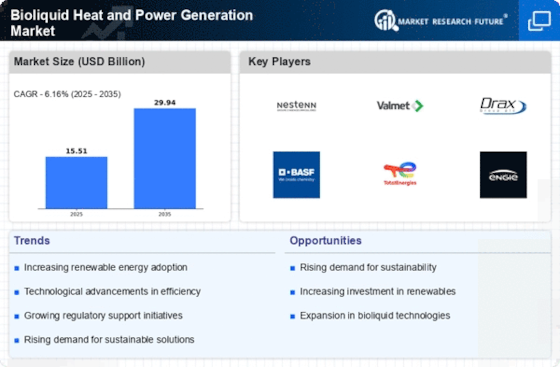Top Industry Leaders in the Bioliquid Heat & Power Generation Market

*Disclaimer: List of key companies in no particular order
Top listed companies in the Bioliquid Heat & Power Generation industry are:
Encontech, Argent Energy, Munzer Bioindustrie, Betarenewables, Ensyn Fuels, Bunge, Biox, MBP Group, REG Power Management, Neste, REG, Kraton, BTG, Olleco, Archer Daniels Midland Company, and Cargill Inc.
Fueling Growth: Exploring the Competitive Landscape of the Bioliquid Heat & Power Generation Market
Beneath the rising flames of bioliquid-powered boilers and the steady hum of bio-fueled generators lies a dynamic battleground – the bioliquid heat & power generation market. This multi-billion dollar space pulsates with activity, as established giants, nimble innovators, and regional specialists grapple for a share in the sustainable energy revolution. Let's delve into the key strategies, market dynamics, and future trends shaping this rapidly evolving landscape.
Key Player Strategies:
Global Titans: Companies like Neste, REG Power Management, and Drax Group leverage their extensive reach, diverse feedstock access, and established production facilities to maintain their dominance. They cater to a wide range of applications, from residential heating to industrial power generation, offering various bioliquid types (bioethanol, biodiesel) and advanced technologies for efficient energy extraction. Neste's NEXBTL renewable diesel showcases their focus on advanced biofuel production and market diversification.
Technology Disruptors: Startups like Ensyn Fuels and Betarenewables are disrupting the market with innovative technologies like hydrothermal liquefaction and gasification, enabling processing of diverse, non-food feedstocks like waste biomass and algae. They cater to environmentally conscious customers seeking sustainable and readily available fuel sources. Ensyn Fuels' RTP technology showcases their focus on converting waste wood into renewable diesel.
Cost-Effective Challengers: Chinese manufacturers like MBP Group and Biox are making waves with competitively priced bioliquids, targeting cost-sensitive markets in developing countries. They focus on affordability and basic functionality, often partnering with local fuel distributors for market access. Biox's biodiesel offerings exemplify their focus on cost-effective solutions for essential energy needs.
Niche Specialists: Companies like Albioma and Kraton excel in specific segments like small-scale cogeneration plants, biofuel blending for existing infrastructure, and tailor-made bioheating solutions for rural communities. They offer specialized expertise, adaptable systems, and local market knowledge for a defined customer base. Kraton's biogas upgrading technology showcases their focus on on-site bioenergy production and efficient utilization.
Factors for Market Share Analysis:
Feedstock Diversity and Availability: Utilizing sustainable and readily available feedstocks like waste biomass, energy crops, and algae reduces reliance on traditional fossil fuels and minimizes environmental impact. Companies with diverse feedstock portfolios gain an edge.
Technological Innovation: Investing in R&D for next-generation conversion technologies, improving efficiency, and minimizing waste products is crucial for cost reduction and environmental sustainability. Companies leading in innovation attract premium contracts and early adopters.
Cost and Affordability: Balancing advanced features with competitive pricing is vital for mass adoption, particularly in cost-sensitive markets. Companies offering affordable bioliquids without compromising performance or emission standards stand out.
Policy and Regulatory Landscape: Navigating favorable government policies like carbon pricing schemes, renewable energy subsidies, and biofuel blending mandates significantly impacts market growth and project feasibility. Companies with strong policy advocacy and regulatory compliance gain an advantage.
New and Emerging Trends:
Focus on Sustainable Feedstocks: Utilizing feedstocks like waste cooking oil, agricultural residues, and algae minimizes land use change and deforestation concerns. Companies embracing circular bioeconomy solutions attract environmentally conscious investors and regulatory benefits.
Integration with Renewable Energy Systems: Coupling bioliquid power generation with solar, wind, and geothermal energy creates hybrid systems for increased system resilience and flexibility in renewable energy deployment. Companies offering integrated solutions stand out in this evolving energy landscape.
Digitalization and Smart Grid Integration: Implementing sensors, data analytics, and smart grid technologies for optimized bioliquid production, demand forecasting, and grid stabilization unlocks new growth opportunities. Companies embracing digitalization cater to the increasing demand for data-driven energy solutions.
Focus on Carbon Capture and Storage: Capturing and storing carbon emissions generated from bioliquid production further minimizes environmental impact and contributes to carbon neutrality goals. Companies investing in carbon capture technologies gain a competitive edge and align with climate change mitigation strategies.
Overall Competitive Scenario:
The bioliquid heat & power generation market is a dynamic and complex space with diverse players employing varied strategies. Established giants leverage their reach and diverse feedstock access, while technology disruptors introduce innovative solutions for non-food feedstocks. Cost-effective challengers cater to budget-conscious buyers, and niche specialists excel in specific segments. Factors like feedstock diversity, technological innovation, affordability, and policy landscape play a crucial role in market share analysis. New trends like sustainable feedstocks, renewable energy integration, digitalization, and carbon capture offer exciting growth opportunities. To fuel growth in this evolving market, players must prioritize sustainable practices, embrace technological advancements, adapt to policy changes, and explore integrated energy solutions. By harnessing the power of bioliquids with adaptability and strategic partnerships, they can secure a dominant position in this promising green energy revolution.
Latest Company Updates:
Encontech:
• Dec 2023: Completed installation of its 5 MW bio-oil boiler for a paper mill in India, reducing fossil fuel reliance by 30%. (Source: Encontech press release)
Argent Energy:
• Oct 2023: Secured NOK 120 million funding for scaling up its bio-HVO production for renewable heating fuels. (Source: Argent Energy press release)
Munzer Bioindustrie:
• Nov 2023: Received government grant for research into advanced bioliquid fuels for power generation. (Source: Munzer Bioindustrie website)
Betarenewables:
• Sep 2023: Partnered with an engineering firm to develop bioliquid-fueled combined heat and power (CHP) systems for commercial buildings. (Source: Betarenewables press release)










